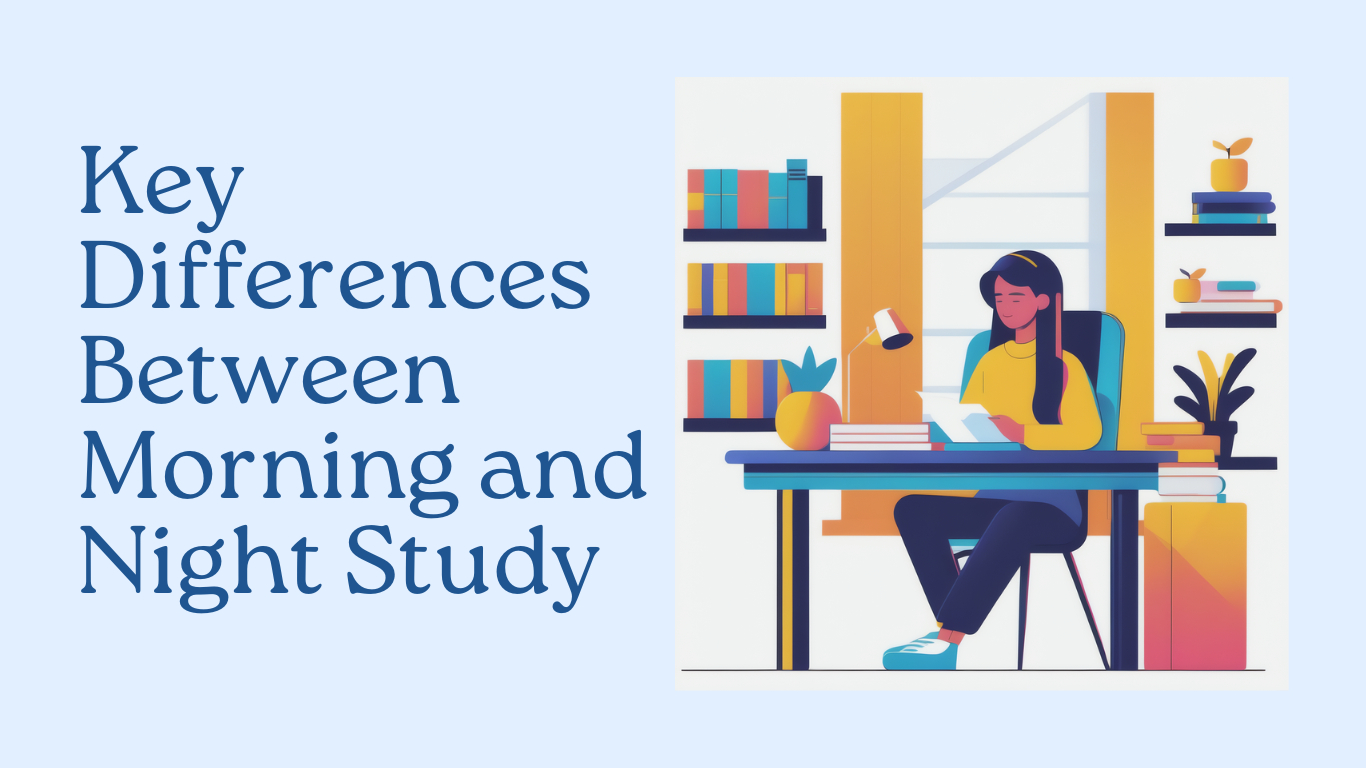
Table of Contents
Introduction: Why Timing Matters in Studying
Finding the best time to study is a common challenge for students, especially with busy schedules and varying energy levels. While some people find that their brains are sharpest in the morning, others find that studying late at night helps them focus best. So, how do you determine the best time to study for success? Let’s learn about the benefits of morning and night study sessions so you can choose the best option for your unique learning style.
1. Benefits of Morning Study Sessions
For some people, the morning is when they are freshest and most alert, especially after a good night’s sleep. Here’s why studying in the morning can be beneficial:
Higher Energy Levels:
After a night’s rest, the brain can absorb and retain new information.
Better Natural Light:
Sunlight can improve focus and mood, improving retention.
Fewer Distractions:
The early morning hours are generally quieter, which means fewer distractions.
Increased productivity:
Starting the day by studying creates a sense of accomplishment and can improve overall productivity throughout the day.
Tip:
If you choose to study in the morning, start with more challenging subjects, as your brain’s maximum cognitive function is generally higher in the first half of the day.
2. Benefits of Night Study Sessions
Nighttime can be an ideal study period for those who feel more creative and alert after dark. Here’s why studying at night is effective:
Quiet and Calm:
The late-night hours are generally peaceful, offering fewer interruptions.
Increased Creativity:
Some studies show that creativity rises in the evening, making it a great time to brainstorm or tackle complex problems.
Longer, uninterrupted time:
Without other daily tasks to compete for attention, it’s easier to devote a solid block of time to studying.
Flexibility for Night Owls:
Many students naturally feel more awake and focused during the evening, making it a comfortable time to study.
Tip:
If you prefer to study at night, consider your sleep schedule. Getting enough rest is vital for memory retention and mental health.
3. Key Differences Between Morning and Night Study

Here’s a comparison to help you decide which time might suit your goals and lifestyle:
| Factor | Morning Study | Night Study |
| Energy Levels | Higher after rest | Varies, but can dip due to fatigue |
| Light and Ambience | Natural light and morning calm | Darker, quieter, peaceful |
| Creativity | Typically lower | Often higher |
| Distractions | Fewer in early hours | Minimal late at night |
| Effect on Sleep | Maintains regular sleep patterns | Can disrupt sleep if too late |
4. Finding Your Best Study Time: Tips to Decide

Although both morning and night have their benefits, choosing your ideal study time depends on individual factors:
Consider Your Natural Body Clock:
Are you naturally a morning person or a night owl?
Try Both Times:
Try studying both mornings and nights for a week and note when you feel most focused.
Adjust Based on Your Schedule:
Choose a study time that best matches your school, work, and social commitments.
Focus on Consistency:
Whatever time you choose, sticking to a regular study schedule helps improve concentration and memory.
Conclusion: The Best Time to Study is Personal
Ultimately, the best time to study depends on your unique preferences, lifestyle, and maximum attention span. Some students thrive in the morning’s peace, while others find their pace under the evening stars. Experiment to find what works best for you, and remember: consistency, comfort, and a positive study environment are essential to achieving success, no matter what time.
FAQs:
1. Is it better to study in the morning or at night?
This depends on personal preferences and lifestyle. Morning study sessions tend to increase retention and concentration while studying at night can be effective for deeper focus and creativity.
2. What are the benefits of studying in the morning?
The benefits of studying in the morning include better concentration, improved memory retention, and alignment with the body’s natural circadian rhythm, making it easier to stay alert.
3. Why do some students prefer to study at night?
Nighttime is quieter and has fewer distractions, allowing students to focus better. Some people also experience increased creativity and problem-solving abilities at night.
4. How can I determine my best study time?
Pay attention to when you feel most focused and alert during the day. Experiment with different time slots and track your productivity to find your ideal study period.
5. Does studying late at night affect sleep?
Yes, studying late can disrupt sleep patterns and reduce cognitive function the next day. If you study at night, make sure you get enough sleep.
6. What is the best time to study for exams?
The best time is when you can focus without any distractions. However, studying in the morning or afternoon with breaks often leads to better long-term retention.
7. How many hours should I study a day?
This varies depending on the subject and the individual. Generally, 3-5 hours of focus with breaks is effective. Quality matters more than quantity.
8. Does studying at the same time everyday help?
Yes, consistency builds a habit, improving attention and efficiency. A set study schedule trains your brain to be alert and ready to learn.
9. Can studying before bed improve memory?
Yes, reviewing material before bed can improve memory, as the brain processes and consolidates information during sleep.
10. What should I do if I fall asleep while studying?
Take frequent breaks, drink water, walk around, or change your study technique. Studying in a well-lit, airy space can also help maintain alertness.

